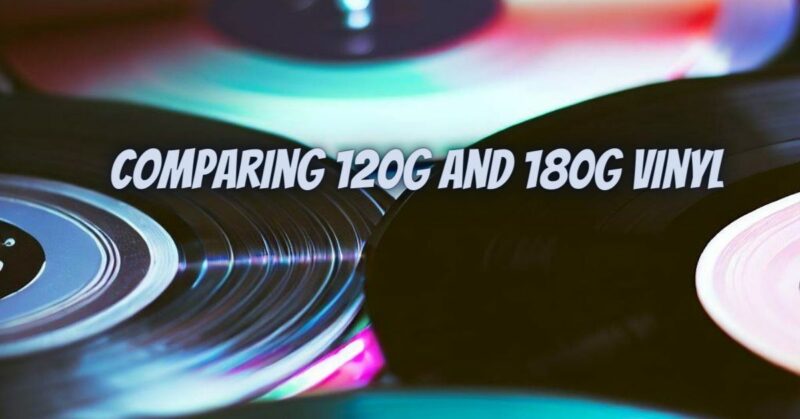Vinyl records have made a remarkable resurgence in recent years, captivating music enthusiasts with their warm analog sound and nostalgic appeal. When collecting vinyl, one often encounters two common weight categories: 120g and 180g vinyl records. These weight distinctions represent variations in vinyl thickness and density, and they can significantly impact the listening experience. In this comprehensive article, we will explore and compare 120g and 180g vinyl records, shedding light on their characteristics, advantages, and considerations for collectors and audiophiles.
Understanding 120g and 180g Vinyl
Definition:
- 120g Vinyl: 120g vinyl refers to vinyl records that weigh approximately 120 grams per 12-inch disc. This weight category is considered standard and is commonly used for both new and vintage vinyl pressings.
- 180g Vinyl: 180g vinyl, on the other hand, is significantly heavier and thicker than its 120g counterpart. These records weigh approximately 180 grams per 12-inch disc.
Characteristics:
- Weight: The most apparent difference between 120g and 180g vinyl is their weight. 180g records are noticeably heavier and denser compared to 120g records.
- Thickness: 180g vinyl is thicker due to its increased mass, resulting in a sturdier, more rigid record.
- Sound: Audiophiles often claim that 180g vinyl offers superior sound quality with better bass response, reduced surface noise, and enhanced overall audio clarity compared to 120g vinyl.
The Benefits of 120g and 180g Vinyl
120g Vinyl
Advantages:
- Affordability: 120g vinyl records are generally more affordable than their 180g counterparts, making them an accessible choice for collectors and enthusiasts on a budget.
- Availability: A wide range of albums, including new releases and vintage classics, is available in 120g pressings. They are often the standard format for vinyl releases.
- Nostalgia: Many vintage vinyl records from the golden era of analog music were originally pressed on 120g vinyl, allowing collectors to experience music as it was in its heyday.
Considerations:
- Sound Quality: While 120g records can offer excellent sound quality, some audiophiles argue that they may not match the sonic depth and clarity of 180g vinyl.
- Durability: 120g records are thinner and lighter, which may make them more prone to warping over time if not stored properly.
180g Vinyl
Advantages:
- Enhanced Sound: Audiophiles often prefer 180g vinyl for its perceived superior sound quality. The added mass and thickness can contribute to reduced surface noise and better bass response.
- Durability: 180g vinyl is less prone to warping and damage due to its increased thickness and rigidity, making it a more durable choice for collectors.
- Collectibility: Limited edition releases and audiophile pressings are more likely to be issued on 180g vinyl, making them attractive collector’s items.
Considerations:
- Cost: 180g vinyl records are generally more expensive than their 120g counterparts, primarily due to their higher production costs and perceived audio quality.
- Playback Equipment: To fully appreciate the benefits of 180g vinyl, a high-quality turntable and cartridge are recommended.
Making Your Choice
The choice between 120g and 180g vinyl ultimately depends on your preferences, budget, and collecting goals. Both formats offer unique advantages, and the enjoyment of vinyl records transcends weight distinctions. Consider factors such as sound quality, affordability, collectibility, and the availability of your favorite albums when building your vinyl collection.
Whether you opt for the affordability and accessibility of 120g vinyl or the enhanced audio quality and durability of 180g vinyl, the joy of playing records and immersing yourself in the analog music experience remains a cherished aspect of vinyl collecting. Ultimately, the format you choose should align with your personal preferences and the specific nuances of your listening setup.


